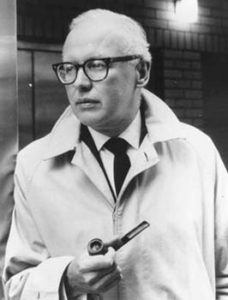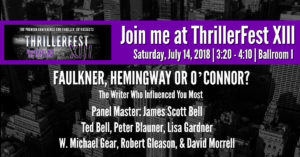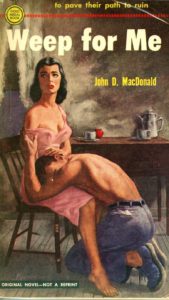by James Scott Bell
@jamesscottbell
On July 14 I’ll be leading a panel at ThrillerFest on literary influences. The guests are David Morrell, Lisa Gardner, Ted Bell, Peter Blauner, Robert Gleason and W. Michael Gear. Still time to register for TFest. Hope to see some of you there.
That subject got me thinking about the authors who have influenced me, so I thought from time to time I’d write about them, and some of the lessons learned.
I begin with John D. MacDonald. For those of you unfamiliar with his work, here’s a clip from The Red Hot Typewriter by Hugh Merrill:
From the 1950s through the 1980s, John Dann McDonald was one of the most popular and prolific writers in America. He was a crime writer who managed to break free of the genre and finally get serious consideration from critics. Seventy of his novels and more than 500 of his short stories were published in his lifetime. When he died in 1986, more than seventy million of his books had been sold.
 I first became seriously interested MacDonald when I read that he was one of Dean Koontz’s favorite writers. I’d read a couple of the Travis McGee books, for which MacDonald is most famous. But it was when I picked up some of his 1950s paperback originals that I really got into him. I went on a collecting binge for several years and now have a full collection of said paperbacks, including the one hardest to get, Weep For Me (1951). MacDonald refused to let it be reprinted. He was embarrassed by it, calling it a lousy imitation of James M. Cain. (I went to her in that shadowy place under the concrete arch. The early traffic slammed across the bridge, tearing the air. I took what I had won, the way any animal does.) It’s better than that (the folks at Random House have decided to give it life again) but was still hewing to the minimalist style popularized by Cain, Hammett, and Spillane—who were all beholden to Hemingway.
I first became seriously interested MacDonald when I read that he was one of Dean Koontz’s favorite writers. I’d read a couple of the Travis McGee books, for which MacDonald is most famous. But it was when I picked up some of his 1950s paperback originals that I really got into him. I went on a collecting binge for several years and now have a full collection of said paperbacks, including the one hardest to get, Weep For Me (1951). MacDonald refused to let it be reprinted. He was embarrassed by it, calling it a lousy imitation of James M. Cain. (I went to her in that shadowy place under the concrete arch. The early traffic slammed across the bridge, tearing the air. I took what I had won, the way any animal does.) It’s better than that (the folks at Random House have decided to give it life again) but was still hewing to the minimalist style popularized by Cain, Hammett, and Spillane—who were all beholden to Hemingway.
In those early years MacDonald wrote science fiction, hard-boiled detective, crime, contemporary adult, and even a multi-protagonist novel (The Damned) centered around a single event, influenced no doubt by Thornton Wilder’s The Bridge of San Luis Rey.
One theme he returned to was the existential angst of the 50s man. His 1953 novel, Cancel All Our Vows, is superior to Sloan Wilson’s more famous The Man in the Gray Flannel Suit (1955). It’s the story of one Fletcher Wyant, age 36, a middle manager at a big company. The following passage is quintessential MacDonald:
And, as he was looking, it happened to him again. It was something that had started with the first warm days of spring. All colors seemed suddenly brighter, and with his heightened perception, there came also a deep, almost frightening sadness. It was a sadness that made him conscious of the slow beat of his heart, of the roar of blood in his ears. And it was a sadness that made him search for identity, made him try to re-establish himself in his frame of reference in time and space. Fletcher Wyant. He of the blonde wife and the kids and the house and the good job. It was like an incantation, or the saying of beads. But the sadness seemed to come from a feeling of being lost. Of having lost out, somehow. He could not translate it into the triteness of saying that his existence was without satisfaction. He was engrossed in his work and loved it. He could not visualize any existence without Jane and the kids. Yet, during these moments that seemed to be coming more frequently these last few weeks, he had the dull feeling that somehow time was eluding him, that there was not enough of life packed into the time he had.
When MacDonald finally settled on writing mostly crime fiction, he produced some true classics, like The End of the Night, which pre-dated Truman Capote’s In Cold Blood, and The Executioners, the basis of the movie Cape Fear. (Note: The 1962 Gregory Peck-Robert Mitchum version is better than the 1991 Robert De Niro-Nick Nolte remake directed by Martin Scorsese, though it was a nice gesture to give both Peck and Mitchum minor roles in that one.)
There’s a great story around the writing of The Executioners. MacDonald regularly met with a group of writers in Florida, one of whom was MacKinlay Kantor. Kantor, who had won a Pulitzer Prize for fiction, used to needle MacDonald about all the “paperback trash” he wrote. One day he asked John, “When are you going to write a real book?”
MacDonald was ticked. He said he could write a book in thirty days that would be serialized in a magazine, become a book club selection, and be turned into a movie. Kantor laughed. MacDonald bet him fifty bucks. And, of course, won.
The first lesson I picked up from a wide reading of MacDonald is what he termed “unobtrusive poetry” in the style. That’s not an easy thing to accomplish. You don’t want a style that calls so much attention to itself that’s all the reader is thinking about. On the other hand, it’s not stripped-down minimalism of the Hemingway-Cain school.
MacDonald found the right place. His books are filled with passages that capture a character or setting with just a few incandescent lines. Here’s an example from one of the Travis McGee books, Darker Than Amber:
She sat up slowly, looked in turn at each of us, and her dark eyes were like twin entrances to two deep caves. Nothing lived in those caves. Maybe something had, once upon a time. There were piles of picked bones back in there, some scribbling on the walls, and some gray ash where the fires had been.
I’ve never forgotten that image. Indeed, I believe MacDonald could have been one of our best mainstream writers, a Book-of-the-Month Club darling like Norman Mailer or John O’Hara. He could have written “big” books that weren’t disasters. But his paperbacks paid the bills, and that’s what he kept producing.
Which brings me to another aspect of his career that inspired me—his work ethic. MacDonald came out of corporate America and approached his writing like a job. He wrote each day from morning till noon, had lunch, went back to work and knocked off at five for a martini and dinner. He took Sundays off.
MacDonald also left behind a legacy of short stories. Two collections of his crime and mystery stories are The Good Old Stuff and More Good Old Stuff. But I think I prefer his more literary collection, End of the Tiger. One of the stories, “The Bear Trap,” inspired me to try my own hand at this type of tale. So in honor of JDM, I’m making my story “Golden” free this week. Enjoy.
John D. MacDonald was once asked how he’d like his epitaph to read. His answer: “He hung around quite a while, entertained the folk, and was stopped quick and clean when the right time came.”
MacDonald’s time came much too soon. He died at age 70 from complications arising out of heart surgery. He left his wife an estate worth $5 million (in 1986 dollars) and left the rest of us some really good stuff. Not a bad way for a writer to go after all.



I found a MacDonald short story collection called, The Good Old Stuff, at a garage sale just last month. I burned through it in two days.
Sometimes I’ll read a passage from one of his novels and I just have to stop. I say to myself, “How did he do that?”
All my books by J.D.M. are tarnished with my notes, penciled into the margins, whole paragraphs underlined.
Right on, Carl. Glad to hear you’re a “marker upper” too. I’ve copied numerous JDM passages and put them in a notebook with other examples of “unobtrusive poetry.”
John D. MacDonald is one of my favorite authors. He inspired me to write better just by reading his books. I got hooked on the Travis McGee books and read everyone one of them, I think.
There’s a pretty good (but rarely seen) McGee movie based on Darker Than Amber. Rod Taylor does a nice job as McGee, and Theodore Bikel is perfectly cast as Meyer. JDM wanted McQueen or tough-guy actor Vic Morrow for McGee. Sam Elliott was McGee in a TV movie in ’83. The role needs a special blend of toughness and world-weary humor. Maybe at one time it could have been Bruce Willis.
Thanks for the introduction. JDM sounds inspirational. My nightstand pile has dwindled to 1/2 of a Baldacci left. Seems like it’s MacDonald time.
Perfect timing! May I suggest that for his stand alones, you begin with Cape Fear (retitled from The Executioners) or The End of the Night.
For McGee, you can read them in order if you like, but I’d start with Darker Than Amber, which has an immortal opening line:
We were about to give up and call it a night when somebody dropped the girl off the bridge.
I’ve often used that line in workshops I’ve given on openings! McDonald has long been a fave, although I admit I’m partial to McGee. I think he’s one of the greatest unsung philosophers I’ve ever read.
Thanks for the literature lesson, Jim. I read a couple of JDM’s books after you mentioned his “unobtrusive poetry” in a previous post or email response on “how to include literary techniques” in one’s writing. Like, Patricia, his writing inspired me to write better, to look for that perfectly crafted phrase that paints a picture with a few quick brush strokes.
Steve, JDM was a champion “re-writer.” His office was filled with those crumpled wads of paper ripped out of his typewriter.
I debated whether to comment, because what I’m about to say (considering all the other comments) is going to sound sacrilegious. I have a copy of THE EXECUTIONERS. I’ve had it probably 20 years, but I’ve never read past page 30. The reason — I find the dialogue to be painful. Just my humble opinion.
Laurie, you have hit upon the aspect of JDM’s work that does engender some criticism—dialogue. Partly that’s due, I think, to the time period. I never find it “painful,” but sometimes it sticks out a bit, mainly in the McGee books when female characters call McGee “darling.”
As I’ve written and told you before, Mr. JSB, authors the likes of, James M. Cain, Dashiel Hammet, Ray Chandler, Spillane etc were practically unknown to me. I had read “The Maltese Falcon” and was aware of Chandler & Cain from movies but the others… That all changed when I moved the US. I’ve become a huge James M. Cain fan ( I even paid homage to him by naming the main character in my noir novella “Twelve and a Half Years” Jimmy McCain) but my favorite is Jim Thompson, who I only discovered once I moved here. I have yet to discover the works of John D. MacDonald – I know, take me out to some back alley and overdose me on a volley of lead pills – but I will now move him to the top of the “must read” list. Thanks for drawing my attention to a great writer.
Craig, you have some good reading ahead. Sunnier than Mr. Thompson. Maybe a little light after the dark room of The Killer Inside Me is called for.
Yes, indeed. A little variety helps the perspective.
I have never read anything by John D. MacDonald, but I plan to start, based on your comments about his work and the sample passages–he sounds fantastic. I am visiting my son in Virginia this week, going to a good used bookstore this afternoon, perhaps I’ll find something by MacDonald.
– Picked up your short story too.
Thanks for all the solid advice and recommendations in your posts and your books.
There’s usually a well-stocked MacDonald section in used bookstores, though they tend to favor the McGees. There is nothing like finding one of the 50s titles in good condition. The covers are so great. Good luck in your search.
If one likes paperbacks, there is Abe Books online. It’s nice, too, that e-versions are readily available now and forever.
My husband introduced me to JDM back in the ’70s and I inhaled his books like cocaine. Unobtrusive poetry, work ethic, and unforgettable characters remain benchmarks we should all aspire to.
BTW, your recent ITW webinar on dialogue was exceptional. Wish I could go to Thrillerfest and see you in person. Thanks for all your help!
Thanks, Debbie, for the good word. Hmmm….cocaine? Definitely 70s!
Never tried it but had many friends who did, to their detriment. My drug of choice was reading.
Whew!
Got into a great spirited debate over John D. MacDonald a few years ago: Which was better, his standalones or his McGee novels?
Nobody’s ever going to win anybody over to their side, and objectively, the difference is probably pretty negligible. There were good standalones and not-so-great ones; there were inspired McGees and phoned-in McGees.
I love them all, but I prefer his standalones for the reason I prefer all standalones: it’s easy to get more emotionally involved in a story in which anything could happen to anyone, that certain characters will never be exempted from the worst possible outcomes by commercial considerations.
It’s impossible to pick a favorite MacDonald, but I recently reread MURDER IN THE WIND after not having picked it up since my college days thirty years distant, and was surprised at how I fell in love with it all over again. Like THE DAMNED, it’s a multi-protagonist wide-screen tale of people with various agendas and secrets whose paths intersect as they try — and, of course, fail — to drive their way out of a hurricane bearing in on Tampa.
Jim, it really is pointless to compare JDM to himself, because the two endeavors are so different. What would be more interesting sometime is to compare the McGees with the second-most popular series of that type at the time, the Shell Scott books by Richard Prather.
Right. The JDM standalones vs. series argument had the overheated, inebriated tone of an all-night college-dorm-room bullshit session. And we were all in our forties or fifties. And I didn’t feel so good the next morning ….
I discovered MacDonald with the movie version of Darker Than Amber, which I didn’t like. Not sure why. But I did read the book, and was hooked. I don’t have a favorite. It is JDMs writing that sings to me. His work takes me to another world, not the gritting streets of Spillane’s New York or Chandler’s Los Angeles, but the bright sunny world of Florida. Then he shows us the dark underbelly that is in all of us. I love it. Thanks for reminding me how good unpretentious writing can be.
Should also mention how great so many of his endings are. Last lines that resonate.
Indeed
When a dear friend died years back, he left me all his JDM books — just paperbacks (“just?”) — but all the colors of the rainbow. So I’ve been working through them for years now.
Two other things struck me about his work:
He goes off on tangents (which we are told never to do). Yet they are small gems in and of themselves. Often, they are about the environment, but sometimes just commentary on society, politics or women or drink. His buddy Meyer is famous for his maze-like mind.
Second, his work is often hilarious. Couple times, I have laughed out loud at some aside, just tossed in there for what appears to be no good reason. (But there is always a reason in JDM). One of the funniest passages I remember is his description of a Manhattan matron walking her poodle. Will see if I can find it and get back to you…
Those tangents that McGee takes are JDM’s chance to vent. You are right, Kris, that this is a high-wire act. I’ve tried it in short bits in my Romeo books. But I’m always nervous about it.
Likewise. In sure hands, it can be insightful into the character’s brain. But it’s easy to lose grip on the reins.
I’m mid-Romeo’s Hammer right now. And I love the tangents, so fear not. 😉
Thanks, Justine! I am relieved. I love doing them, but as Kris warned, you have to get a grip.
Popping in late. Thanks for the introduction to MacDonald’s work, Jim. He sounds like an inspiration to us all.